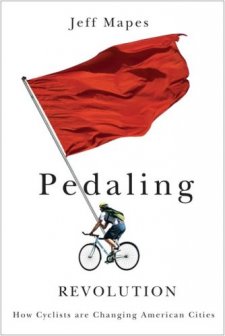Event Friday: In Pursuit of a Streets Revolution
 "Pedaling Revolution: How Cyclists Are Changing American Cities," by Portland, Oregon-based reporter and bike commuter Jeff Mapes, is both an intimate and wide-angle account of the ways some urban cyclists are acting, together and separately, to push their cities toward more equitably-apportioned streets.
"Pedaling Revolution: How Cyclists Are Changing American Cities," by Portland, Oregon-based reporter and bike commuter Jeff Mapes, is both an intimate and wide-angle account of the ways some urban cyclists are acting, together and separately, to push their cities toward more equitably-apportioned streets.
In this sense, the book is about the power of demonstration, when combined with the efforts of dedicated planners and gutsy politicians. But it also deals with the formidable structural and cultural obstacles to human-scaled, multi-modal streets in US cities. In particular, Mapes thoroughly critiques the socio-spatial legacy of automobile dominance in the last generation’s worth of urban planning, inviting readers to consider how their own behavior is both product and propagator of this high-speed, sprawl-supporting urban vision.
Mapes asserts that the growing urban cycling trend amounts to "a grassroots movement to seize at least part of the street back from motorists," and describes the bravery, foresight, and sometimes bravado of these "urban cowboys" as heralding "a new society on the streets." The book chronicles the unique stories of activists’ commitments to the bicycle, and situates them within broader urban planning and development politics in each city he explores — Davis, California, Madison, Wisconsin, Portland and New York, where Mapes is led around by Transportation Alternatives’ Noah Budnick and Paul Steely White.
Mapes’ accessible prose delves into debates over the bicycle’s role in urban mobility. For instance, are cyclists to be blamed for careless or expedient behavior, such as flouting traffic lights or even endangering pedestrians, where streets are engineered for fast-moving auto traffic and human-powered modes are relegated to the margins? If many would-be cyclists are deterred because they fear for their safety, yet the only definitive way to improve road safety is to increase the number of cyclists on the streets, what will nudge cities to prioritize safety in ways long-established in many European cities?
Says Mapes: "In America, we spend more on dental research than traffic safety research. Because we are so wedded to our cars and to our freedom on the road, we tend to resist any restrictions … we don’t even like to own up to the full toll of automotive mayhem, which is the equivalent of two jumbo jetliners crashing every week and killing everyone aboard." With this resounding statement, the book’s implications are clear: cycling is a statement for non-motorists’ rights in the absence of a supportive state.
In such unlikely cities as Los Angeles, Houston, Atlanta and Detroit, the next step is to establish toe-holds in local politics, and to form alliances with other street users and sympathetic community groups, to generate movements for modal justice in spite of risk-averse civic leadership and entrenched pro-automobile interests. Until that happens, Mapes concludes, auto-centric planning is likely to remain the norm, and bicycles, along with other human-powered modes, will be left hugging the curb.
This Friday, March 13, Jeff Mapes, Streetsblog’s Aaron Naparstek and representatives of Transportation Alternatives will discuss cycling and efforts across the country to improve cycling infrastructure, followed by Q&A and book signing. Housing Works Bookstore Cafe, 126 Crosby Street, Manhattan, 7 p.m.





